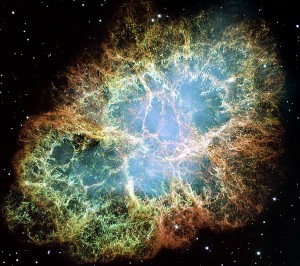 I haven’t had anything to do with biology since I wrote an article years ago about sleeping pills. I found out that the drugs used by 60-gazillion insomniacs to put themselves to sleep are not the chemicals the brain uses to put us to sleep naturally. Can’t neuroscientists just find those brain chemicals and sell them to us? I called and asked; the answer is not that neuroscientists can’t find the chemicals, but that they find way, way too many. Not only that, but each chemical seems also to affect some different and important part of the body: the immune system, the body’s clock, digestion, blood pressure. I was indignant: all those causes for just one effect, and each cause having other effects? What ever happened to the principle of parsimony? I gave up on biology and ever since, have stuck closely to astronomy: the laws of the universe are parsimonious.
I haven’t had anything to do with biology since I wrote an article years ago about sleeping pills. I found out that the drugs used by 60-gazillion insomniacs to put themselves to sleep are not the chemicals the brain uses to put us to sleep naturally. Can’t neuroscientists just find those brain chemicals and sell them to us? I called and asked; the answer is not that neuroscientists can’t find the chemicals, but that they find way, way too many. Not only that, but each chemical seems also to affect some different and important part of the body: the immune system, the body’s clock, digestion, blood pressure. I was indignant: all those causes for just one effect, and each cause having other effects? What ever happened to the principle of parsimony? I gave up on biology and ever since, have stuck closely to astronomy: the laws of the universe are parsimonious.

So a week ago I was listening happily to an astronomer talk about supernovae, stars which balance the outward push of thermonuclear radiation with the inward pull of gravity until they run out of fuel and the radiation dies back and gravity wins – gravity always wins, have I mentioned that? – and the star collapses and then something subatomic and alarming happens, and the star blows itself to hell and gone. It’s dramatic, but logical. Then the astronomer said he needed to figure out the whole process from the subatomic particles up, and take into account the many different ways of blowing up the different kinds of supernovae had, and how the new atoms their explosions were creating changed the way they blew up, and whether maybe the complications of the process might also make weird stars that weren’t supernovas. I stopped listening, mostly because I didn’t understand and partly because he was sounding so much like a biologist.
I asked him afterward why he was studying supernovae in such depth. Supernovae are one of the best measures of a sexy cause-and-effect problem — the universe is apparently expanding faster and faster without having any obvious push – and maybe if they behaved differently, the whole problem would go away. Was that why he was interested in them? I smiled expectantly. No. Not at all. The expansion problem was simple, it was going to be solved. He was interested in the supernovae themselves, in exactly how they blew up, in the details of their explosions, in all their complexity.
But that’s practically biology! He was polite and pitying. No, it’s just science, he said, and went off to find a drink. I stood there alone, facing my new reality, a little frightened by a future of writing about cause and effect so complicated it might as well be biological.
Credits
Sleepiug boy: Nikifor Krylov
Crab Nebula: NASA, ESA, J. Hester, A. Loll
Isn’t it awful? I was raised on the old “biology is chemistry, chemistry is physics, and physics is math” axiom. Turns out it’s actually just one big horrible Moebius strip.
Ms. Finkbeiner,
Reading your blog, I had to laugh! Astronomy and physics seem so hard-edged and clear cut compared to biology. I work in the public affairs & marketing department of an academic medical center that has about 25 biomedical researchers. Most of their research has to do with lung diseases such as tuberculosis and pulmonary fibrosis. Several of them also study clotting and tissue factors — tons of tissue factors. And they’re caught up in trying to understand the myriad pathways that make something like clotting work. As soon as they figure something out, they find something else that they don’t understand and so need to figure out. I could so relate to your comments about neuroscientists and the seemingly infinite number of chemicals that interact in the brain.
Of course, one of the (many) things I find daunting about physics is the nested systems of ever-smaller particles that seem to go on forever, like a funhouse mirror. Attempting to understand the physics of supernovae on a molecular level is truly a stunning thought. I guess it’s not surprising that astronomy could be as messy and complicated as biology. Yep, that really is the way of science: each answer leads to more questions in a kind of karmic cycle. (I really enjoyed your blog. Made me laugh and think.)